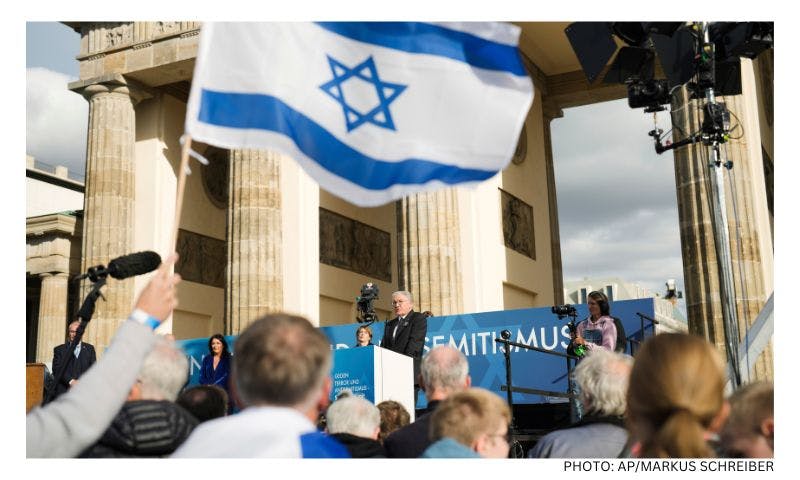Published: 4 March 2022
Last updated: 4 March 2024
COLIN SHINDLER: Ukraine’s leader is a classic Jewish dissident; the longer he can remain in power, the weaker Putin becomes. Putin may win battles, but not the war
“PUTIN IS ABSOLUTELY insane! He is the super villain of today!” So spoke Volodomyr Vysotski of the Jewish Social Initiative in the Ukraine in a recent interview with the BBC. This is a blunt assessment with which the vast majority of Jews will agree.
The threat to use tactical nuclear weapons and the presence of thermobaric “vacuum” weapons in the Ukraine provide further credence to this escalating madness.
For Europeans, Putin's war is seen as an attempt to overturn democracy and to throttle the rule of law in the post-Soviet era. For Russians, it is a generational struggle between those who came of age after the fall of the USSR in 1991 and those who hanker after the past imperialism of Peter the Great and Vladimir Ilych Lenin — those who wish to make Russia great again.
For Jews, it conjures up an imagery of the tragedies of recent Jewish history, carried down from one generation to the next. Putin's war offends against the Jewish respect for difference.
In the age of the internet and satellite communication, the Ukraine is not a far-away country of which we know nothing. The Ukrainian president, Volodymir Zelensky, has shown a mastery in mobilising social media on behalf of the Ukraine. He has won the public relations war against an overconfident Kremlin, heavily weighed down by dreams of the past.
It is, however, Zelensky's soaring rhetoric and displays of defiance that has inspired the citizens of the Ukraine - to defend their independence, prepare Molotov cocktails to throw at the invader and learn to shoot - that has impressed Western observers.
For a non-politician, he has proved himself to be a formidable and intelligent leader who puts to shame the professionals who traipse the corridors of power in many a European capital. For Jews, he follows in the footsteps of countless Jewish dissidents, stretching back through history, a David who does not fear Goliath.
At 16 he was awarded an 'English as a Foreign Language' scholarship to study in Israel but was forbidden to do so by his father.
Zelensky also embraces the tradition of Jewish iconoclasts — a satirist who has ended up by sheer accident as president of the Ukrainian republic. Born to Jewish parents in the late Soviet era in Kryvyi Rih (Krivoy Rog) in the Black Sea region, he grew up as a native Russian speaker who later had to learn both Ukrainian and English.
At the age of 16 he was awarded an “English as a Foreign Language” scholarship to study in Israel but was forbidden to do so by his father.
Kryvyi Rih was founded during the same period as Odessa at the end of the 18th century, following Imperial Russia's defeat of the Ottoman Empire. Tsarist policy opened up the conquered area to Russian colonists to create Novorossiya (New Russia). The Tsars exhorted Jews to take advantage of this opportunity to colonise the territory with promises of greater tolerance within a liberal environment.
This encouragement of Jewish settlement by the Tsarist authorities produced Leon Trotsky, Vladimir Jabotinsky, the Lubavitcher Rebbe, Menahem Schneersohn — and Volodomyr Zelensky. It elevated Odessa to become the first city of Zionism and the pioneering Jewish farms of the Crimea as the prototype of the kibbutz.
Yet despite this historical inheritance, when the current crisis erupted, Israel found itself in a dilemma because it relies on Russia to avoid a clash over Syrian skies and its promise not to interfere in Israeli attacks on Iranian bases. On the other hand, Russia built the Bushehr nuclear plant in Iran and has promised the construction of another eight.
Even so, thousands of Israelis demonstrated in Tel Aviv last week amidst talk about forming international brigades of foreigners to fight in the Ukraine. With all these concerns in mind, Naftali Bennett invoked a policy on neutrality in the conflict in the Ukraine. Israel initially hesitated to support a UN Security Council resolution which condemned the Russian invasion. Yair Lapid, on the other hand, has incrementally aligned Israel with the West's criticisms of Putin, and vowed to back a second UN resolution condemning Russia.
It is no coincidence that he deeply admires Charlie Chaplin and his anti-fascist epic, The Great Dictator.

The difference in approach between Bennett and Lapid recalls Moshe Sharett's attempt to maintain a policy of non-alignment on the outbreak of the Korean war in 1950 and Ben-Gurion's subsequent decision to support the United States.
Zelensky famously became a comedian after studying law in Kiev. His stand invoking satire and irreverence against corrupt and authoritarian figures made him many enemies and even produced an assassination threat. It is no coincidence that he deeply admires Charlie Chaplin and his anti-fascist epic, The Great Dictator.
The real-life President Zelensky has turned out to be a far tougher and more impressive figure than his fictional TV alter ego.
In 2015, he featured as a history teacher who became president in the sit-com, Servant of the People. This blow against a prevailing deference to the powerful captured the imagination of ordinary Ukrainians — and allowed him to win the 2019 election with 73% of the vote.
The real-life President Zelensky, however, has turned out to be a far tougher and more impressive figure than his fictional alter ego.
Zelensky would not have had the opportunity to perform in the Servant of the People, had it not been for the owner of the television station, the oligarch, Ihor Kolomoisky, who is also the benefactor of the Ukrainian Jewish community. Putin has described him as “a unique crook”. Kolomeisky appears to be playing “a wait and see” game; like Roman Abramovitch, he holds Israeli citizenship.
On the other hand, Vladimir Putin, marooned emotionally in his Soviet past, has used every sort of canard from his KGB days to smear the Ukrainian government, labelling it as neo-Nazis and drug dealers. Yet Zelensky's great-grandfather and three great-uncles were murdered by the Nazis in the Shoah.
His grandfather fought in the Red Army and ended up “a colonel in an independent Ukraine”. And as the Jewish Social Initiative in Kiev points out, there have been no instances of government-driven antisemitism since the Maidan Revolution of 2014 and the ousting of the pro-Russian administration.
Zelensky is neither an assimilated Jew distant from his Jewishness nor a devotee of the leading rabbis in the Ukraine. He has said that he speaks to God “without intermediaries”. He admires Israel's stand on issues of security and has repeatedly pointed out that “Israel will not leave Jews in distress to their fate”.
It is not by chance that more than one rabbi has commented on the spiritual significance of Zelensky's determination to remain and fight, despite everything. Hineini: 'Here I am'. I continue.
Zelensky has said that he is the number one target for Putin's elimination squads. It will be remembered that Imre Nagy, the Communist leader of the Hungarian uprising in 1956, was hanged two years later despite being given Soviet assurances of free passage out of the country. Yet the longer that Zelensky can remain in power — and alive — the weaker Putin becomes. Putin may win battles, but he will not ultimately win the war.

Putin believed that the post-Soviet generation shared his dream of a vanquished Ukraine. Clearly it does not. Petitions against the war have been signed by hundreds of thousands in Russia. Despite widespread arrests, demonstrations continue to take place in many locations — and many figures from the world of theatre, sport and music in Russia have spoken out. This is most notable by the privileged, western-educated sons and daughters of the well-to-do elite.
The oligarchs are now unable to fly in their private jets to London, a centre of financial welcome and aggrandisement for pro-Putin Russians, and the rouble has fallen through the floor. Even the neutral Swiss have adopted European Union sanctions on Russia. It is significant that the London-based oligarch, Mikhail Fridman, has publicly opposed the war. When push comes to shove, the oligarchs' first loyalty will not be to the leaders of the Kremlin.
As this distancing continues, some observers are predicting that even if Kyiv falls and there is a tremendous loss of Ukrainian life, a war of attrition will follow amidst all the destruction. Even if there is a partial annexation by Russia, it is clear that any occupying force will face an uphill struggle to subjugate an angry population of 40 million.
When push comes to shove, the oligarchs' first loyalty will not be to the leaders of the Kremlin.
The other possibility is that international sanctions and the isolation of Russia will cause acute resentment amongst ordinary Russian citizens. No one wants a return to the instability and anarchy of the Yeltsin years. The banning of Russian teams in sport will bite deeply - the exemplar is apartheid South Africa.
Several commentators have pointed to Krushchev's fate in 1964 and postulated that Putin will similarly be removed from office when those around him deem him to have become more erratic than pragmatic. But who will strike the first blow — the heads of state corporations, the Army, the FSB? This is an open question. If this happens, then the Ukraine will have become Putin's Suez debacle — the end of empire.
READ MORE
YUVAL NOAH HARARI: Why Vladimir Putin has already lost this war (Guardian)
Artwork: Avi Katz




